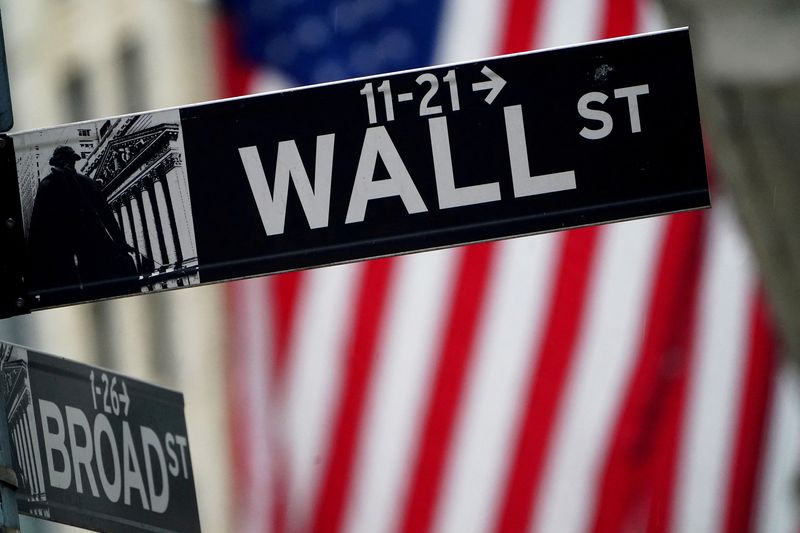By David Randall and John McCrank
NEW YORK (Reuters) - From meme-stock enthusiasts to retirees, this year's steep dive for both stocks and U.S. Treasury prices has upended portfolios for individual investors who had enjoyed watching their wealth grow during the historic rally in financial assets early in the coronavirus pandemic in 2020.
Wall Street's brutal tumble continued on Wednesday, with the worst one-day loss since June 2020 for the S&P 500 . The benchmark index is now down 17.5% from its peak at the start of the year, erasing $499 billion in market value. At one point the S&P was down nearly 20% and on the cusp of confirming a bear market.
Unlike many past market selloffs, this downturn has also slammed U.S. Treasuries prices, pushing up yields, as the Federal Reserve began to reverse the easy money policies that supported the economy during pandemic lockdowns.
Growing more pessimistic, retail traders sold $87 million in equities on net in the past week up to Tuesday, versus a one-year average of $3.3 billion in net buys, according to a note from JPMorgan (NYSE:JPM).
Normally, Treasuries have been considered among the world’s safest investments. But so far in 2022, the ICE (NYSE:ICE) BofA US Treasury Index is down 9.3%, the worst start to the year for Treasuries since 1830 according to Deutsche Bank (ETR:DBKGn). This has slammed investors who counted on the bond market for income and as a buffer against potential stock market losses.
"Most investors have never seen a market environment like this," said Christine Benz, director of personal finance at Morningstar. "It could get worse before it gets better, and that will really test investors' patience."
Many high-flying growth and tech stocks soared during the pandemic, and their steep decline has rattled investors who had bet on them, hoping for the kind of eye-popping rallies seen early last year in GameStop (NYSE:GME) and other so-called meme stocks.
"What I’m seeing is the same thing everyone else is seeing who started 18-to-24 months ago, like, 'oh, look at all of the green, going up, up, up,' and then all of a sudden it’s like, 'oh crud, what is happening?'", said Alex Rutfield, 29, an engineer in the Boston suburbs who has invested over $50,000 in stocks and ETFs that include internet and robotics firms. He said the value of his portfolio has fallen back to around even.
DOUBLE WHAMMY
The dual selloffs in stocks and bonds have been particularly difficult on individual investors who counted on a mix of stocks and bonds to blunt declines in their portfolios, with stocks ideally rising amid economic optimism and bonds strengthening during turbulent times.
That strategy does not work when stocks and bonds fall in unison. The BlackRock (NYSE:BLK) 60/40 Target (NYSE:TGT) Allocation fund, which follows a standard portfolio technique of keeping 60% of its assets in equities and 40% in fixed income to limit risk, is down nearly 12% since the start of the year, its worst performance since it launched in 2006.
The bulk of the selling in both stocks and bonds has been coming from wealthier and older investors, who are reducing their overall risk exposure, mainly through the selling of mutual funds, according to data from Vanda (NASDAQ:VNDA) Research.
Bruce Bagley, 69, founder Santa Rosa Uniform & Career Apparel in Santa Rosa, California, said he has held the course so far in his portfolio, which is 55% stocks, 40% bonds, with the rest in cash, even though everything but his REIT investments have been falling.
"Where else are you going to put your money?" he said.
Investors who had large allocations to bonds, which make up some 20% of retirement accounts on average, according to Morningstar, have canceled vacation plans, are eating in more often, and have reconsidered assistance to other family members, said Melanie Nichols, a wealth advisor at WA Asset Management in Birmingham, Alabama.
"When you have one part of a portfolio that is providing all your income and now you see it down 10% that's frightening," she said. "People are not used to those returns because we don’t have those returns in the bond market very often."
Other retirees are looking for other sources of income to try to rebuild their nest egg.
"You think you have enough to live off for years and now you don't know if it will come back," said one 73-year old former marketing executive in the Cleveland suburbs who had about 30% of her portfolio in bonds and said she was considering finding part-time work to help preserve her retirement savings.

"Clients who had larger allocations to bonds and who really did not want to experience volatility are feeling this, and it has been very destabilizing for those folks," said John Cunnison, chief investment officer at Baker Boyer in Walla Walla, Washington.
(This story adds 'retail' to headline)